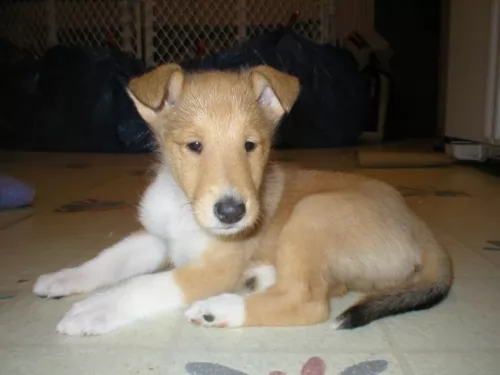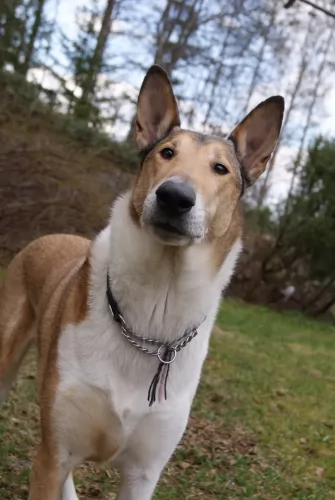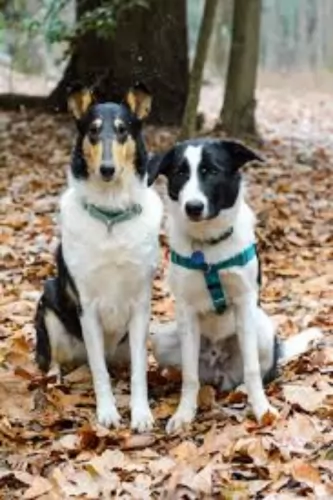 Petzlover
Petzlover Bichon Frise is originated from Spain but Smooth Collie is originated from United Kingdom. Bichon Frise may grow 26 cm / 10 inches shorter than Smooth Collie. Bichon Frise may weigh 20 kg / 44 pounds lesser than Smooth Collie. Bichon Frise may live 4 years more than Smooth Collie. Bichon Frise may have less litter size than Smooth Collie. Bichon Frise requires Low Maintenance. But Smooth Collie requires Moderate Maintenance
Bichon Frise is originated from Spain but Smooth Collie is originated from United Kingdom. Bichon Frise may grow 26 cm / 10 inches shorter than Smooth Collie. Bichon Frise may weigh 20 kg / 44 pounds lesser than Smooth Collie. Bichon Frise may live 4 years more than Smooth Collie. Bichon Frise may have less litter size than Smooth Collie. Bichon Frise requires Low Maintenance. But Smooth Collie requires Moderate Maintenance
 Contrary to the myths and many of the tales of the history of the Bichon Frise, the breed was originally developed in Spain. Later specific trait development occurred in France to give us the lap dog Bichon Frise that we know today. The original Spanish dog – the Bichon – was a water – sailing dog. It was descended from the poodle breeds crossed with either the water spaniels or the Barbet. These early dogs were friendly and happy and because of this, sailors carried them with them on their ships and even bartered them for supplies. Prior to the 14th century the Spanish probably brought them to the Canary Islands. Later in the 14th century they we discovered again by Italian sailors who returned them to Europe where they lived in the courts of the nobility. During the Renaissance and after the French fell in love with the breed while the Spanish continue to enjoy their presence.
Contrary to the myths and many of the tales of the history of the Bichon Frise, the breed was originally developed in Spain. Later specific trait development occurred in France to give us the lap dog Bichon Frise that we know today. The original Spanish dog – the Bichon – was a water – sailing dog. It was descended from the poodle breeds crossed with either the water spaniels or the Barbet. These early dogs were friendly and happy and because of this, sailors carried them with them on their ships and even bartered them for supplies. Prior to the 14th century the Spanish probably brought them to the Canary Islands. Later in the 14th century they we discovered again by Italian sailors who returned them to Europe where they lived in the courts of the nobility. During the Renaissance and after the French fell in love with the breed while the Spanish continue to enjoy their presence.
In the late 19th century in France the breed fell out of popularity and became street dogs and circus and fair dogs. They also worked with organ grinders and assisted the blind. In the early 20th century, the Societe Centrale Canine, the National Kennel Club of France, adopted the breed’s official standard – while they were still known as both the Bichon and the Tenerife. The popularity of the breed at this time is heavily attributed to “The Adventures of TinTIn” , by Herge, which featured a small, white, fluffy fox terrier. Then the president of the Federation Cynoloqique Internationale presented a new name for the breed based on its characteristics. The name Bichon Frise kept the Bichon heritage and added “curly” the meaning of Frise. Under this name the breed was admitted to the Societe Centrale Canine stud book in October of 1934.
The Bichon Frise came to the United States for the first time in 19554 and was admitted to the American Kennel Club Stud Book in 1972. They entered the non-sporting group of the AKC in 1973. By 2001 the Bichon Frise, J.R., won the Westminster Dog Show. In 1976, the Bichon Frise came to Australia, imported by Harry and Margaret Begg who oversaw the growth of the breed there. Today there are 4 separate breeds believed to be descended from the original Bichon/Tenerife breeds – the Bichon Frise, the Bichon Bolognaise, the Maltese and the Havanese.
 When you see the Smooth Collie you just assume that you’re looking at a long-haired Lassie-type Collie that was sent to the groomers.
When you see the Smooth Collie you just assume that you’re looking at a long-haired Lassie-type Collie that was sent to the groomers.
The Smooth Collie has always been used for herding purposes and is a short haired version of the Rough Collie. The early history of this dog is unknown and there are quite a few stories surrounding its history.
It seems as though the dog’s history started during the reign of Queen Victoria who is believed to have owned these dogs.
In some countries it is thought that the smooth- and rough collie are one and the same while in other countries they are classified as separate breeds. The dog hails from the United Kingdom and they classify the Smooth Collie as a separate breed from the Rough Collie.
 The modern Bichon Frise is a white, small dog with a round skull and muzzle. The nose should be black and the eyes round and dark. Depending on the size of the dog, the legs and head are proportionate to the body, while the tail should be curly and long. Both the tail and the ears must not be docked. Their coat is as hypoallergenic as a dog gets. It is white, dense and for most Bichon Frise, it is curly. They should have black lips as well.
The modern Bichon Frise is a white, small dog with a round skull and muzzle. The nose should be black and the eyes round and dark. Depending on the size of the dog, the legs and head are proportionate to the body, while the tail should be curly and long. Both the tail and the ears must not be docked. Their coat is as hypoallergenic as a dog gets. It is white, dense and for most Bichon Frise, it is curly. They should have black lips as well.
 The Smooth Collie is a medium to large sized dog, ranging in size from 51–56cm and weighing anything from 18kg to 30kg.
The Smooth Collie is a medium to large sized dog, ranging in size from 51–56cm and weighing anything from 18kg to 30kg.
The Smooth Collie is slightly longer than it is tall and he has a deep chest. Most people are very familiar with the sweet, gentle expression of the Collie dogs.
The dog also has the long slender head, the semi-erect ears and a long tail. The coat of the Smooth Collie is dense and long with the outer hair being straight and harsh. The Smooth Collie comes in different colors – fawn, reddish brown, white,grey, black and tan.
The Smooth Collie is generally an amicable dog, sociable and friendly. He loves his human family and wants to be constantly with them, showing signs of separation anxiety when left for long periods on his own.
He is intelligent too so that he is easily trained. He is totally non-aggressive but that doesn’t stop him from being an excellent watchdog and he’ll alert you to strangers approaching you or your home.
They’re also energetic dogs and will require regular exercise. Although these Smooth Collies make splendid family pets, they are still used for herding purposes.
 The Bichon Frise, according to the American Kennel Club is a cheerful and merry dog. They are gentle, playful, sensitive and affectionate. These dogs love people, are very social and like other dogs as well. They love to play with children and they are intelligent and affectionate. They were developed in their latter stages by the French to be “lap dogs” or companion animals. They are not territorial by nature but can become so if confined and encouraged. Start obedience training early and be consistent throughout their lives. They take to training easily if positive techniques are used. They do however, have a reputation for not taking well to housetraining. Be persistent
The Bichon Frise, according to the American Kennel Club is a cheerful and merry dog. They are gentle, playful, sensitive and affectionate. These dogs love people, are very social and like other dogs as well. They love to play with children and they are intelligent and affectionate. They were developed in their latter stages by the French to be “lap dogs” or companion animals. They are not territorial by nature but can become so if confined and encouraged. Start obedience training early and be consistent throughout their lives. They take to training easily if positive techniques are used. They do however, have a reputation for not taking well to housetraining. Be persistent
 Not only is he intelligent, he is playful and energetic too, making a good pet for children and tolerating other pets too.
Not only is he intelligent, he is playful and energetic too, making a good pet for children and tolerating other pets too.
Add to that the fact that he is a a good watchdog and wants to protect his family. Sweet and gentle, the Smooth Collie is guaranteed to make a wonderful addition to your family.
 The coat of the Bichon Frise can easily become matted if not brushed or combed every day. Severe matting can lead to a hematoma in their ears. They are also very prone to ear infections so paying a lot of attention to their ears is imperative. They are will chew and scratch themselves if not groomed well and this can cause skin infections and conditions. They might have allergies to fleas, pollen, chemicals, and dust. The patella (knee cap) can be loose, diabetes, cataracts and heart disease also affect the Bichon Frise. In the United Kingdom the number one cause of death for the breed is old age -13 plus years, with 21% dying of cancer. In North America cancer is the number one killer as it is for most dogs. The Bichon might also be afflicted with hematologic disorders such as AIHA (Autoimmune hemolytic anemia) and ITP (Immune-mediated thrombocytopenia) which while less common than cancer will kill the dog much earlier in life than cancer. The other condition that the Bichon Frise is prone to are liver shunts. If found early they can be surgically corrected but most are not, and liver failure is eventually the cause of death.
The coat of the Bichon Frise can easily become matted if not brushed or combed every day. Severe matting can lead to a hematoma in their ears. They are also very prone to ear infections so paying a lot of attention to their ears is imperative. They are will chew and scratch themselves if not groomed well and this can cause skin infections and conditions. They might have allergies to fleas, pollen, chemicals, and dust. The patella (knee cap) can be loose, diabetes, cataracts and heart disease also affect the Bichon Frise. In the United Kingdom the number one cause of death for the breed is old age -13 plus years, with 21% dying of cancer. In North America cancer is the number one killer as it is for most dogs. The Bichon might also be afflicted with hematologic disorders such as AIHA (Autoimmune hemolytic anemia) and ITP (Immune-mediated thrombocytopenia) which while less common than cancer will kill the dog much earlier in life than cancer. The other condition that the Bichon Frise is prone to are liver shunts. If found early they can be surgically corrected but most are not, and liver failure is eventually the cause of death.
 Your gentle smooth haired collie can live to be 12 to 14 years of age if he enjoys a good life, but like with other dog breeds, they can also be susceptible to certain common dog illnesses.
Your gentle smooth haired collie can live to be 12 to 14 years of age if he enjoys a good life, but like with other dog breeds, they can also be susceptible to certain common dog illnesses.
This is when the chromosomes that determine how the eyes develop are mutated, so that the blood vessels that nourish the retina and absorb scattered light are underdeveloped. When this mutation occurs it is in both eyes, but one eye could be more severely affected than the other.
Your vet will do a complete examination of your dog’s eyes to find out what the extent of the defect is.
This is a life threatening problem where the stomach twists. It is more prevalent in deep chested dogs. It can help by feeding your dog two smaller meals a day instead of one larger one which he gobbles up quickly.
Also known as Gray Collie Syndrome, this rare disease affects the neutrophils of a dog, which are an important part of the immune system. Bacterial infections and a shortened lifespan are your dog’s lot with this illness.
 Being a small dog, the Bichon Frise is susceptible to obesity and that condition will be terminal in the end for this breed. So make sure you do not overfeed your Bichon Frise. The same is true with the use of treats. The Bichon loves treats and loves the association with treats of having pleased you. They should be fed small meals – about ¼ cup of good high quality dry food twice a day.
Being a small dog, the Bichon Frise is susceptible to obesity and that condition will be terminal in the end for this breed. So make sure you do not overfeed your Bichon Frise. The same is true with the use of treats. The Bichon loves treats and loves the association with treats of having pleased you. They should be fed small meals – about ¼ cup of good high quality dry food twice a day.
As previously mentioned the Bichon Frise is susceptible to:
Hematomas and infections of the ear if not groomed well and consistently.
Cancer is number one killer.
Hematological Issues are deadlier than cancer.
Liver shunts are a very serious concern.
Though the Bichon Frise is not an overly active dog, they do love to play. They are characterized by short bursts of activity followed by long periods of rest. They can be worn out just by running around the house. You must play with them everyday as well as take them on a walk each day. Bichons are fast and agile and do well in agility trials. They also like to compete in rally and obedience trials. Most of all they love to and need to play with their people every day.
 Your Smooth Collie deserves the very best food there is because of the wonderful companionship he provides you with. You want him to enjoy good health and a long life with you.
Your Smooth Collie deserves the very best food there is because of the wonderful companionship he provides you with. You want him to enjoy good health and a long life with you.
If you buy one of the commercially manufactured dog foods, make sure it is one of the best – packed with vitamins and minerals and good, natural ingredients.
Follow the instructions on the packaging for portion sizes. Also include some plain, wholesome dog food made at home. The perfect example of this is boiled chicken, brown rice or pasta and sweet potatoes, spinach and carrots all chopped up and added to your dog’s dry kibble as a treat twice a week. No need to add in exotic spices. Avoid onions.
Try and include some raw meat into the diet once in a while too. Make sure your Smooth Collie has a constant supply of fresh, cool water.
This is one of the best things you can do for your Collie, eliminating the possibility of your pet becoming a parent of unwanted puppies.
Brush your Smooth Collie twice a week. He is a moderate shedder but has a couple of heavier shedding periods.
While brushing your pet, check inside the ears for signs of infection, check that his eyes are still bright and alert and check inside his mouth for bad teeth. He can’t tell you about a rotting tooth and this can cause a host of other problems for your dog.